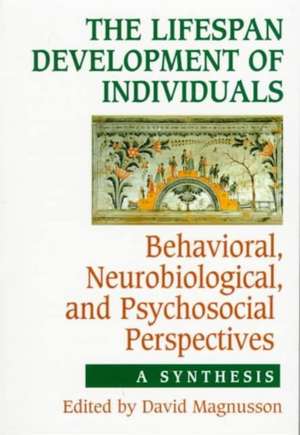The Lifespan Development of Individuals: Behavioral, Neurobiological, and Psychosocial Perspectives: A Synthesis
Editat de David Magnussonen Limba Engleză Paperback – 27 oct 1997
Preț: 800.78 lei
Preț vechi: 1045.38 lei
-23% Nou
Puncte Express: 1201
Preț estimativ în valută:
153.25€ • 159.40$ • 126.52£
153.25€ • 159.40$ • 126.52£
Comandă specială
Livrare economică 28 martie-09 aprilie
Doresc să fiu notificat când acest titlu va fi disponibil:
Se trimite...
Preluare comenzi: 021 569.72.76
Specificații
ISBN-13: 9780521628969
ISBN-10: 0521628962
Pagini: 546
Ilustrații: 120 b/w illus. 7 colour illus. 7 tables
Dimensiuni: 152 x 230 x 27 mm
Greutate: 0.73 kg
Ediția:Revised
Editura: Cambridge University Press
Colecția Cambridge University Press
Locul publicării:New York, United States
ISBN-10: 0521628962
Pagini: 546
Ilustrații: 120 b/w illus. 7 colour illus. 7 tables
Dimensiuni: 152 x 230 x 27 mm
Greutate: 0.73 kg
Ediția:Revised
Editura: Cambridge University Press
Colecția Cambridge University Press
Locul publicării:New York, United States
Cuprins
1. Design for a life Patrick Bateson; Part I. Early Development; 2. Areal specialization of the developing neocortex: differentiation, developmental plasticity and genetic specification Dennis D. M. O'Leary; 3.Genes and environment John C. Loehlin; 4. Causes and outcome of perinatal brain injury Osmund Reynolds; Commentary; 5. A systems view of psychobiological development Gilbert Gottlieb; Part II. The Changing Brain; 6. Neurotransmitter receptors in the changing brain: allosteric transitions, gene expression and pathology at the molecular level Jean-Pierre Changeux; 7. Learning, memory and synaptic plasticity: cellular mechanisms, network architecture and the recording of attended experience Richard G. M. Morris; 8. Brain size, behavior and the allocation of neural space Dale Purves, Leonard E. White, Dake Zheng, Timothy J. Andrews and David R. Riddle; Commentary; 9. Selection and development: the brain as a complex system Gerald M. Edelman and G. Tononi; Part III. Cognition and Behaviour; 10. Cognitive development Franz E. Weinert and Josef Perner; 11. Cognitive and neural development: clues from genetically-based syndromes Ursula Bellugi, Edward S. Klima and Paul P. Wang; 12. Language acquisition at different ages Wolfgang Klein; Commentary: 13. Advances in cognitive neuroscience Antonio R. Damasio and Hanna Damasio; Part IV. Biology and Socialization; 14. Socialization and sociogenesis Robert B Cairns; 15. Patterns of juvenile behavior following early hormonal interventions Robert W. Goy; 16. Gonadal hormones and the organization of brain structure and function Roger A. Gorski; Commentary; 17. The brain and socialization: a two-way mediation across the life course Pierre Karli; Part V. Social Competence; 18. The interpenetration of biology and culture Robert A. Hinde; 19. Temperamental contributions to the development of social behavior Jerome Kagan; 20. Developmental psychopathology as an organizing research construct Sir Michael Rutter; Commentary; 21. Social competence and human conflict David Hamburg; Part VI. Aging; 22. Psychological aspects of aging: facts and frontiers Paul B. Baltes and Peter Graf; 23. Genetics of aging and Alzheimer's disease John Hardy; 24. Aging and molecular biology David G. Morgan and Marcia N. Gordon; Commentary: 25. Biological bases for plasticity during aging of individual life histories Caleb E. Finch.
Recenzii
"...good coverage of some new and interesting data in the various areas. Very well referenced....it will be useful to advanced graduate students, researchers, and professionals in human development." Choice
"Although some aspects cannot yet be explained, this book fits well the objectives and necessities of psychiatrists, neurologists and neuropsychiatrists interested in studying the contribution of current science to the better understanding of the complex human behavior." Celso Agner, M.D., Neurological Research
"This book has accomplished a serious mission...students of all disciplines that intersect with behavioral biology will be well served by use of this volume, as will scientists faced with the ever increasing challenge of our information age to be cognizant of related fields and interdisciplinary work." Human Ethology Bulletin
"Although some aspects cannot yet be explained, this book fits well the objectives and necessities of psychiatrists, neurologists and neuropsychiatrists interested in studying the contribution of current science to the better understanding of the complex human behavior." Celso Agner, M.D., Neurological Research
"This book has accomplished a serious mission...students of all disciplines that intersect with behavioral biology will be well served by use of this volume, as will scientists faced with the ever increasing challenge of our information age to be cognizant of related fields and interdisciplinary work." Human Ethology Bulletin
Descriere
Integrates findings from biological and social sciences to form a holistic view of human development.
